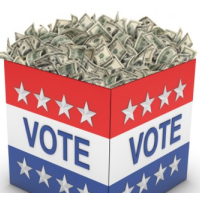Los Angeles Considers Paying Voters to Cast Their Ballots

The Los Angeles City Council is considering a plan to boost turnout on Election Day by directly or indirectly paying people to vote.
As unethical as that suggestion may seem on its face to some, the proposal comes from the city’s Ethics Commission, which argues otherwise.
In a letter to the council, the commission said the city’s abysmal turnout—23% in the 2013 mayoral election—could be substantially boosted by offering incentives for people to vote. They said there were a number of approaches to the problem but offered a suggestion they thought could be implemented quickly.
The commission proposed a lottery of sorts for people who cast a ballot. The city would hold a lottery-type drawing within 30 days after the election and award cash prizes to the random winners. The commission said it “envisioned a pilot program for 2015” and mused about a couple of payoff scenarios. The first would issue 100 individual awards of $1,000 apiece and the second would hand out a $50,000 top prize and two $25,000 rewards.
Anticipating legal problems down the road, the prizes could not be offered in elections when candidates for federal office are on the ballot. And the City Charter might need to be amended by a vote of the people if the prize money were taken from one of the commission’s suggested sources, the Matching Funds Trust Fund.
Not everyone loved the idea. The New York Post called it a “mad scheme.” Conservative columnist George Will suggested it was akin to offering a public bribe. He also thought it would encourage the wrong kind of people to vote, which, one supposes, could undo the work done by Republicans who promote vote suppression through voter ID laws while opposing the early-casting of ballots and absentee-voting.
Lefty blogger Jon Green at AmericaBlog sounded almost chagrined to find himself somewhat in agreement with Will about paying voters, although not so much about discouraging them from voting.
He listed a string of alternatives that have been found to boost voting without a cash transaction. But first, he cited a study that indicated if you offer people $25 to vote, they not only vote 4.3% more often, they make an effort to learn about the issues. That notwithstanding, Green would prefer some of the alternatives.
Mailing people a copy of their voting history increased turnout more than paying them $25. Prodding potential voters to think about a plan for voting, like asking them to identify their polling place, got about the same response as the cash incentive. Poll parties on Election Day increased voting between 2.6% and 6.5%. His favorite is same-day registration, which would have the biggest bang for no bucks.
In making its recommendation, the Ethics Commission said there were other proposals to boost turnout that were worth considering, but they would take a while to implement and, although voting throughout the United States, in local, state or national elections, has been miserable for decades, time was of the essence.
The Los Angeles Times wrote a lengthy editorial about turnout in the city shortly thereafter and suggested a different tack.
It didn’t mention paying voters to fulfill their obligation to perform the single most important duty and right entrusted to citizens. Instead, the newspaper sifted through 30 suggestions (pdf) made by the Municipal Elections Reform Commission and latched on to the first one. The editorial suggested moving the lowest-turnout events, which occur at odd times in odd years, to dates when state and national elections occur in even years.
That, at least one member of the reform commission said, would double turnout.
–Ken Broder
To Learn More:
Matching Funds and Voter Turnout (Los Angeles Ethics Commission)
Paying People to Vote in LA Is a Bad Idea (by Jon Green, AmericaBlog)
Cashing In on Voting (by George Will)
A Simple Fix for L.A.'s Voter Turnout Problem (Los Angeles Times editorial)
Report of the City of Los Angeles Municipal Elections Reform Commission (pdf)
- Top Stories
- Controversies
- Where is the Money Going?
- California and the Nation
- Appointments and Resignations
- Unusual News
- Latest News
- California Forbids U.S. Immigration Agents from Pretending to be Police
- California Lawmakers Urged to Strip “Self-Dealing” Tax Board of Its Duties
- Big Oil’s Grip on California
- Santa Cruz Police See Homeland Security Betrayal in Use of Gang Roundup as Cover for Immigration Raid
- Oil Companies Face Deadline to Stop Polluting California Groundwater





